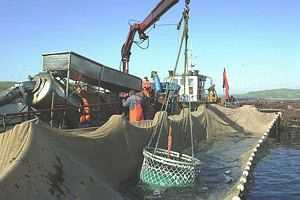|
A new study has linked levels of persistent organic pollutants (POPs) in farmed salmon to feed containing fishmeal and oil.
Research, published in the Environmental Science and Technology journal, is said to show the presence of a wide range of POPs, including polychlorinated biphenyls (PCBs) polybrominated diphenyl ether (PBDE flame retardant) and organochlorine pesticides in farmed salmon, wild European Atlantic salmon and aquaculture feed and fish oils.
The lead author of the study, Miriam Jacobs of Surrey University said that while toxic dioxins were believed to be decreasing in food, the concentration of PCBs was "far greater" and that regulatory attention needed to focus on this greater threat.
According to the study, farm raised salmon could be a "significant source" of pollutants, and there was evidence of recent use of DDT as a treatment.
Jacobs and Adrian Covaci and Paul Schepens of Antwerp University analysed wild and farm raised British and Norwegian salmon samples, fish feed and fish oils. High levels of PCBs and moderate levels of PBDEs and pesticides were found in both wild and farmed salmon, though the provenance of some of the wild samples was uncertain and may have been farm escapees.
Tests on fish oil supplements showed that those produced in the southern hemisphere contained less POP than that from the northern half of the globe, with samples from the Baltic showing a much higher level of contamination than those from Peru.
The study also found a linkage between levels of PCBs and pesticides, but flame retardants followed a different pattern, suggesting they came from another source.
|
